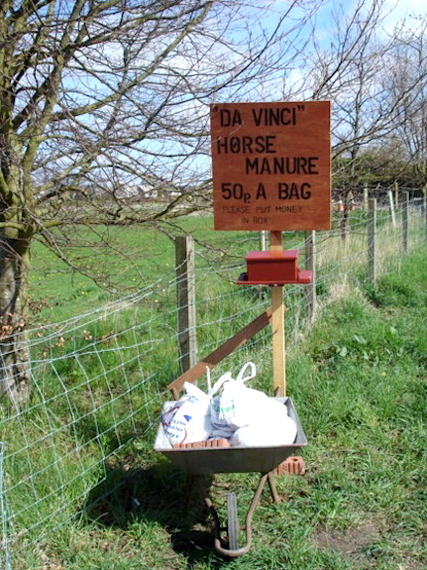On a trip to Scotland, I took a bus from Edinburgh to Rosslyn Chapel, which was the film location at the end of The Da Vinci Code, from Dan Brown's book. Walking up the hill to the chapel, I passed someone's creative effort to make some Da Vinci money - a wheelbarrow of heavily filled white plastic bags and a sign that said: "Da Vinci Horse Manure, 50p a Bag."
Inside the chapel, there are two pillars, one carved by the master mason in charge of the building's stonework and the other by his young apprentice. Legend says that the master was so jealous of the apprentice's superior pillar that he hit him in the head with a mallet and killed him. As punishment, a replica of the master mason's face was carved into a corner of the chapel, forcing it to stare forever at the apprentice's pillar.
Most of us have known a moment of jealousy. It comes up when we're afraid of loss. One of my friends has a husband who adores her and is loyal to his core, but she feels jealous anyway. It's crazy to watch. Since she lives in fear of not having him, she can't experience the joy of being with him.
She tries to possess and control him by getting angry. It works somewhat, in that he behaves cautiously. He avoids being alone with women and avoids talking to women in her presence.
But because she's in a relationship with fear - believing every negative thing she tells herself - it doesn't matter what he does. Her relationship with fear is bigger than her relationship with him.
And the fear is not her friend. It's drains her energy and causes her to believe the worst. She says things like, "Everyone's competing with me. I can't trust or depend on anyone, especially him. And I'm always so tired!"
Some other friends of mine divorced recently. And their teenage daughter goes back and forth between her old home with her dad and her mom's new home. She's desperately afraid of losing her dad, so she tries to restrict his freedom to hold onto him. She insists that his new girlfriend not be allowed to go into her bedroom, and she demands that the girlfriend not be at the house when she visits.
Of course, there's no way that her dad can resolve the situation so that she'll feel satisfied and safe. She's so afraid of losing him that she's losing him.
Relationships that are based on emotional manipulation will be possessive and draining. "I want to be your one-and-only, to have you for myself. Otherwise, I'll feel threatened."
People who express jealousy want someone else to make them feel happy and secure. And it's just not possible. Only we can do that for ourselves.
So what's the answer?
Hashing out the reasons behind our fear and jealousy is a common method, but hashing leads to more focus on the problem, which doesn't help us find an answer.
What will help is to become conscious of our real motivations by noticing what happens, identifying the cause, and acknowledging that we set it in motion. It's called naming the name of whatever we're doing.
A good way to name the name is, at the end of each day, to go back and explore each time we released negative emotions toward anyone or anything. We can't stop doing what we don't know we're doing. And we can't be released from what we're not willing to admit. So the first step is to identify it.
Our negative emotions aren't good or bad. They're effective or ineffective at achieving the results we want. It's just energy that we express in various forms. We can call it grief, hurt, offense, frustration, resistance, anger, jealousy, possessiveness, dominance, defiance, bitchiness, etc.
Getting super honest would mean saying what we really mean and calling our emotions by what we intend for them to accomplish. Instead of saying, "You make me angry!" say, "I can't stand it when you don't do what I want, and I choose anger to try to control you." Instead of saying, "You hurt me when you look at other women," say, "I feel jealous because I'm afraid of losing you, and I'm desperately trying to hold onto you so that I can feel safe and loved."
The good news is that, when our behavior patterns aren't working for us, acknowledging them - without judging or justifying them or feeling guilty - will cause them to lose power over us. And that's a first step in choosing supportive behaviors.
Then we can say to our partners. "I want you to enjoy the moments that you're with me and also the moments that you're not with me. And I want us to enjoy being together because we want that, not because we're obligated."
The goal is to take responsibility for our emotions and actions, in order to release ourselves and others from any uncomfortable energy that we've been expressing.
It's like emptying our personal wheelbarrows of horse manure every night. And the big prize is that we get to feel good about ourselves.
You can see more of Grace's posts on her blog at gracederond.com. And you can follow her on Facebook and Twitter.
